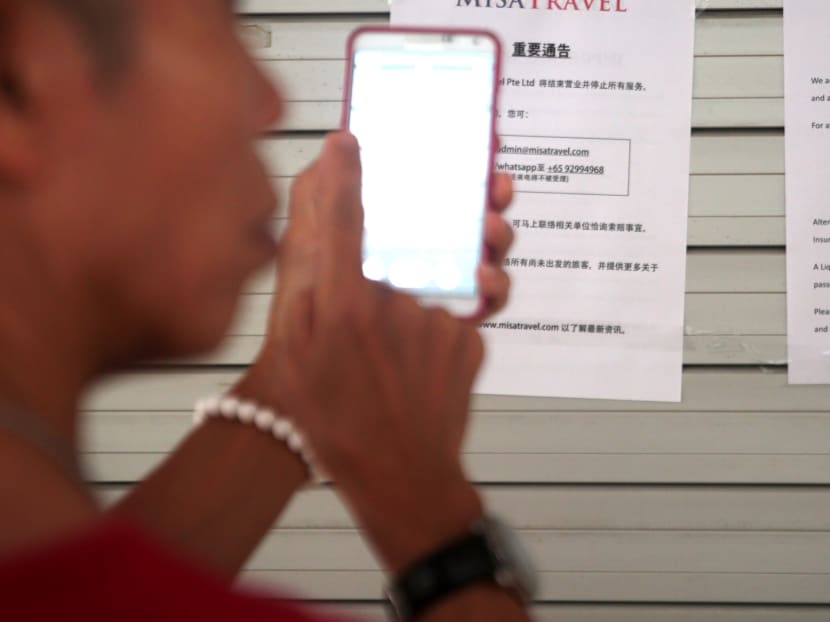Higher fine, new licensing system to protect consumers from errant travel agents
SINGAPORE — To better protect consumers from rogue travel agents, changes to the Travel Agents Act and Regulations were passed in Parliament on Tuesday (Nov 7). They would take effect from January next year, the Ministry of Trade and Industry said.

Amendments to the Travel Agents Act and Regulations were passed in Parliament on Tuesday (Nov 7), which will see the penalty for unlicensed travel agent activities increase from S$10,000 to S$25,000. Photo: Jason Quah/TODAY
SINGAPORE — To better protect consumers from rogue travel agents, changes to the Travel Agents Act and Regulations were passed in Parliament on Tuesday (Nov 7). They would take effect from January next year, the Ministry of Trade and Industry said.
One key amendment is the increased penalty for unlicensed travel agent activities. The fine for the offence has been raised from S$10,000 to S$25,000.
Errant travel firms that hope to re-open under a different name will also find it harder to do so.
Ms Sim Ann, Senior Minister of State for Trade and Industry, said at the second reading of the Bill: “When making licensing descisions, the Singapore Tourism Board (STB) will consider additional factors including whether the individuals involved with the travel agency, such as company directors, are suitable to hold the licence. For instance, individuals who had previously contravened travel agent legislation might be denied licences.”
The enhanced Bill will also broaden the powers of the STB against suspected errant agents.
For example, the board will now be allowed to publish information relating to the suspension or revocation of licensees, and require licensees facing suspension or revocation to disclose this fact to the public, so as to help consumers make more informed decisions.
STB will also be able to take photos, video or audio recordings as evidence of offences.
There are about 1,200 licensed travel agents in Singapore.
Mr Lim Biow Chuan, Member of Parliament (MP) for Mountbatten who is also president of the Consumers Association of Singapore, told the House that he had received 792 complaints against travel agencies and had seen more than 15 agencies end its business operations over the last five years.
In May, for example, travel agency Misa Travel abruptly shut down, affecting tour groups that were headed for regional destinations such as Hong Kong and Thailand.
Mr Lim called for frequent checks on the accounts of travel agencies. “This will allow STB to better anticipate whether a travel agency may be facing financial difficulties, and allow STB to step in to protect the deposits paid by consumers as early as possible.”
Ms Sim agreed, but cautioned that though such checks may unveil possible “tell-tale signs of financial difficulties”, they ultimately cannot safeguard against business failures.
In another change to the legislation, companies that sell and arrange tours within Singapore with passenger-carrying conveyance — including walking tours, bicycle tours and Segway tours — will not be required to apply for a licence.
For those that sell or arrange tours here that do not include accommodation, such as coach tours or bumboat tours, they may apply for a niche licence, which will require a S$50,000 paid-up capital and net worth.
Previously, they needed S$100,000 upfront capital to get a general licence.
The new licensing regime seeks to lower regulatory costs for operators, Ms Sim explained.
During the debate on the changes to the Bill, three MPs spoke up about the proliferation of online travel agents or booking platforms.
Mr Lim, Nee Soon GRC MP Louis Ng, and Tampines GRC MP Desmond Choo raised concerns over who regulates online travel entities and how consumers may recover their prepayments if these online entities cease operations.
In response, Ms Sim said that whether an online entity falls within the jurisdiction of Singapore’s legislation largely depends on whether it has physical presence here in supplying travel products.
“If (they do have) physical presence in Singapore (and) contracts with consumers for the supply of a travel product, or sells or arranges tours in Singapore, the entity will require a travel agent licence,” she said.






